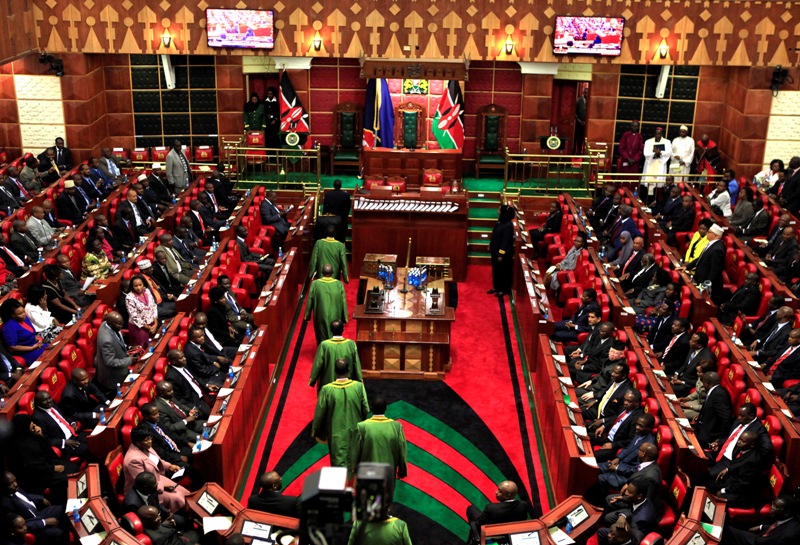Parliament on Tuesday night approved 24 of the 86 clauses of the controversial Finance Bill, 2023, with Kenya Kwanza MPs shooting down all amendments proposed by the opposition Azimio coalition in a protracted session that lasted past 12.30am.
The MPs are expected to revisit the Bill at the Committee of the Whole House on Wednesday afternoon, where MPs will scrutinise the draft legislation clause by clause and propose amendments.
The Bill seeks to raise additional revenue in taxes in the region of Sh130 billion to finance the Kenya Kwanza administration’s Sh3.6 trillion budget for the 2023/24 financial year.
The Finance and National Planning Committee chairman will lead the House in moving amendments to the Bill when the House reconvenes at 2.30pm.
The session expected to tackle stormy issues including the doubling of Value Added Tax (VAT) on petroleum levy to 16 per cent, the imposition of 1.5 per cent Housing Levy and changes to the first and second schedule of the Excise Duty Act that grants exemptions and zero rating of tax on a number of goods and services.
The Kenya Kwanza lawmakers successfully marshalled numbers to defeat amendments to Clause 24 of the Income Tax Act on individual rate of tax.
The MPs wanted to reduce the income tax rate from the Finance and Planning committee proposal to create additional two tax bands that attract tax at the rate of 32.5 per cent and 35 per cent.
The committee had proposed that for the first Sh288,000 or Sh24,000 and below per month, the rate be 10 per cent while those earning up to Sh388,000 will incur 25 per cent income tax rate.
For the next Sh5.6 million or Sh467,000 per month be charged 30 per cent income tax while those earning up to Sh3.6 million or Sh767,666 incurs 32.5 percent.
All income above Sh9.6 million or Sh800,000 per month will now attract income tax at the rate of 35 percent.
Kenya Kwanza voted to defeat amendments by opposition MPs James Nyikal (Seme, ODM), Robert Mbui (Kathiani, Wiper) and Antony Oluoch (Mathare ODM) who proposed the deletion of the new individual tax rate banks.
Mr Oluoch had proposed that the rate be fixed at 10 per cent on the first Sh288,000, 25 per cent on the next Sh100,000, 30 per cent on the next Sh212,000 and 30.5 per cent on income above 600,000.
The Kimani-led committee also introduced two new items that impose an individual income tax rate of 15 per cent of the repatriated income under section 7B of the Income Tax Act.
Individual income tax rate of 20 per cent will apply in the case of digital content monetisation.
Mr Kuria also successfully moved amendments to Clause 10 of the Bill to allow contribution by employer to the housing levy to be a tax-deductible expense when calculating the corporation tax of the employer.
The committee had minor amendments to clauses 12 and 14 as a way of clean-up and there were no changes either proposed by the House team or opposition MPs for clauses 15 to 19.
On clause 20, Funyula MP Oundo Ojiambo failed to push through an amendment to the Bill that reduces rental income tax from the current 10 per cent to 7.5 per cent.
Mr Oundo wanted to include a provision requiring that only a person appointed by the Kenya Revenue Authority (KRA) Commissioner General in writing may deduct tax if he or she is registered by the Estate Agents Registration Board established under the Estate Agents Act.
Mr Kimani successfully lobbied Kenya Kwanza MPs to reject Mr Oundo’s amendment, arguing it will discriminate against the majority of the landlords who collect rent themselves.
Mr Kimani also pushed through changes to clause 22 that seeks to amend the First Schedule and Second Schedule on the Income Tax Act on exemption of tax on income accrued, derived or accrued in Kenya as well as investment deductions.
The committee included exempted from tax income by a non-resident contractor, sub-contractor, consultant or employee involved in the implementation of a project financed through a 100 per cent grant under an agreement between the government and the development partner, to the extent provided for in the agreement.
Those who will benefit are non-resident who are in Kenya solely for the implementation of the project financed by the 100 per cent grant.
The amendment also exempts income tax on gains on transfer of property within a special economic zone enterprise, developer and operator.
The exemptions will further extend to royalties, interest, management fees, professional fees, training fees, consultancy fee, agency or contractual fees paid by a special economic zone developer, operator or enterprise, in the first 10 years of its establishment, to a non-resident person.



